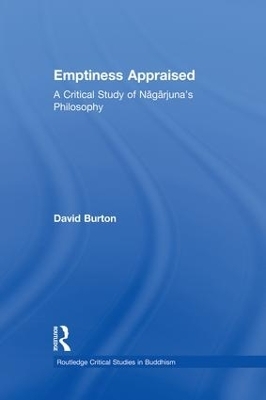
Emptiness Appraised
A Critical Study of Nagarjuna's Philosophy
Seiten
2015
Routledge (Verlag)
978-0-415-51521-4 (ISBN)
Routledge (Verlag)
978-0-415-51521-4 (ISBN)
Emptiness means that all entities are empty of, or lack, inherent existence - entities have a merely conceptual, constructed existence. Though Nagarjuna advocates the Middle Way, his philosophy of emptiness nevertheless entails nihilism, and his critiques of the Nyaya theory of knowledge are shown to be unconvincing.
David Burton
Chapter One Introduction; Part I Part I; Chapter Two N?g?rjuna and Scepticism; Chapter Three Non-Conceptuality and Knowledge of Reality; Chapter Four The Problem of Nihilism; Part II Part II; Chapter Five The Purpose of Part II; Chapter Six The Ny?ya Pram??a Theory; Chapter Seven N?g?rjuna’s Non-Apprehension of Entities; Chapter Eight Mutually Dependent Existence; Chapter Nine The Attack on Validation: Introduction; Chapter Ten The Attack on Intrinsic Validation; Chapter Eleven The Attack on Extrinsic Validation; Chapter Twelve The Attack on Validation: Conclusion; Chapter Thirteen The Argument from the Three Times; Chapter Fourteen Further Arguments in the Vaidalyaprakara?a; Chapter Fifteen Conclusion;
| Erscheint lt. Verlag | 27.4.2015 |
|---|---|
| Reihe/Serie | Routledge Critical Studies in Buddhism |
| Verlagsort | London |
| Sprache | englisch |
| Maße | 156 x 234 mm |
| Gewicht | 294 g |
| Themenwelt | Geisteswissenschaften ► Philosophie ► Östliche Philosophie |
| Geisteswissenschaften ► Religion / Theologie ► Buddhismus | |
| Sozialwissenschaften ► Soziologie | |
| ISBN-10 | 0-415-51521-1 / 0415515211 |
| ISBN-13 | 978-0-415-51521-4 / 9780415515214 |
| Zustand | Neuware |
| Haben Sie eine Frage zum Produkt? |
Mehr entdecken
aus dem Bereich
aus dem Bereich


